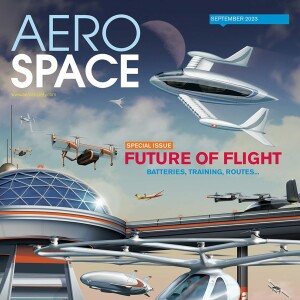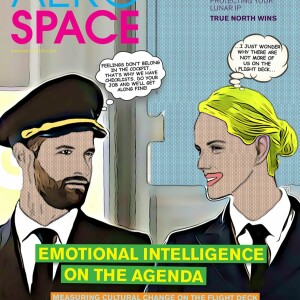Royal Aeronautical Society Podcast
The Royal Aeronautical Society is the world’s only professional body dedicated to the entire aerospace community. Established in 1866 to further the art, science and engineering of aeronautics, the Society has been at the forefront of developments in aerospace ever since.
Episodes

Monday Sep 11, 2023
Monday Sep 11, 2023
After training with the RAF just after the First World War and service in India, Capt Mollard made his way to Imperial Airways, and tells us about life at Croydon Airport and the London to Paris route.
In 1929 Mollard was transferred to Cairo and, as Imperial flew further towards Australia, so did he. Here he co-piloted Captain Alger in the hair-raising first experimental mail flight to Australia in 1931 and delivered one of the first Armstrong-Whitworth Atalantas that would serve on the soon to be opened Calcutta to Singapore route.
The Second World War saw him continue to work for Imperial Airways, including surviving flights to Mauritius. In 1947 he became Malaysian Airways’ technical advisor. He started in the airline’s early days, when it flew only three aircraft and stayed long enough to help build it up into ‘a little goldmine’.
Captain Mollard was interviewed by David Jones in around 1975. This recording is part of the AeroSociety Podcast series, Development of Civil Aviation from the UK to Australasia, it was digitised thanks to a grant from the RAeS Foundation and the podcast was edited by Eur Ing Mike Stanberry FRAeS.

Monday Sep 11, 2023
Monday Sep 11, 2023
The captain of the 1937 flying boat survey flight from Karachi to New Zealand explains how he became involved in the historic event and how they prepared for the flight, before retelling the story of the eventful trip. He also discusses the warm welcome they received in New Zealand and further afield.
Captain Burgess was interviewed by David Jones in around 1975. This recording is part of the AeroSociety Podcast series, Development of Civil Aviation from the UK to Australasia, it was digitised thanks to a grant from the RAeS Foundation and the podcast was edited by Eur Ing Mike Stanberry FRAeS.

Tuesday Aug 29, 2023
Tuesday Aug 29, 2023
In this podcast series from the Royal Aeronautical Society's monthly AEROSPACE magazine, Editor in Chief Tim Robinson and Deputy Editor Stephen Bridgewater analyse recent aviation, aerospace and space news - and preview the next (September 2023) edition of the magazine. Find out more at www.aerosociety.com

Wednesday Aug 16, 2023
Wednesday Aug 16, 2023
Captain Egglesfield commanded some of the earliest commercial flights over India and the Far East including the first scheduled service from Karachi to Calcutta in July 1933 in an Armstrong Whitworth AW.15 Atalanta, the first scheduled Karachi to Rangoon service, and the second survey flights on flying boats between Karachi and Singapore. In this interview he tells us about these pioneering flights, the aircraft he flew, the challenges he faced and gives us a flavour of what life was like flying the route.
Captain L. A. Egglesfield was interviewed by David Jones on 11 June 1975. This recording is part of the series Development of Civil Aviation to Australasia 1918-1978, it was digitised thanks to a grant from the RAeS Foundation and the podcast was edited by Eur Ing Mike Stanberry FRAeS.

Wednesday Aug 16, 2023
Wednesday Aug 16, 2023
In April 1931 Captain Alger was asked to fly the first experimental airmail flight between Karachi and Darwin in his de Havilland DH.66, the City of Cairo. In this interview Alger retells the story of this eventful flight.
Captain H. W. C. Alger was interviewed by David Jones on 8 June 1975. This recording is part of the AeroSociety Podcast series, Development of Civil Aviation from the UK to Australasia, it was digitised thanks to a grant from the RAeS Foundation and the podcast was edited by Eur Ing Mike Stanberry FRAeS.

Friday Jul 28, 2023
Friday Jul 28, 2023
In this podcast series from the Royal Aeronautical Society's monthly AEROSPACE magazine, Editor in Chief Tim Robinson and Deputy Editor Stephen Bridgewater analyse recent aviation, aerospace and space news - and preview the next (August 2023) edition of the magazine. Find out more at www.aerosociety.com

Tuesday Jul 11, 2023
Tuesday Jul 11, 2023
Was the incoming Labour Government right to cancel TSR-2? Was there a possibility of creating an Anglo-French military aircraft programme in the early 1960s? Who was the panellists’ favourite villain in the TSR-2 story? These and many other questions were posed to the conference speakers, and we hear their frank conclusions.

Tuesday Jul 11, 2023
Tuesday Jul 11, 2023
What lessons did the UK’s aerospace industry learn from TSR-2 and what key points can we take into today’s aerospace projects? As a student, Michael Pryce lived close to Ivan Yates, the man who Warton sent to liaise with Weybridge. In his retirement, Yates told Pryce about many of the mistakes that were made on the TSR-2 project and how he learnt from them on his later projects, most notably when he served as the UK’s man on the Jaguar, Tornado and Typhoon. Many of Yates’s observations are of key importance for today’s professionals, most notably for those working on collaborative projects today.

Tuesday Jul 11, 2023
Tuesday Jul 11, 2023
What would have happened if Britain decided to keep TSR-2? Benjamin Goodlad explores the possible strategic and tactical use of the aircraft, discusses the gaps it would have filled and considers which aircraft it could have replaced. He also asks how the RAF armed with an operational TSR-2 would have looked from a bomber and strike command perspective. He also speculates on the impact a successful TSR-2 would have had on its international competitors. This session is followed by a short question and answer session.

Tuesday Jul 11, 2023
Tuesday Jul 11, 2023
The cancellation of TSR-2 left a large gap in the RAF’s armoury, but how should the gap be filled? Samuel Hollins explores the immediate procurement dilemmas faced by Britain upon the death of TSR-2 and examines the viability of the procurement options that presented themselves prior to Tornado. He then goes onto suggest that the Europeanising turn in defence procurement that Britain took from the late-1960s onwards was a partial consequence of the opportunities that emerged in a world without TSR-2, and shaped Britain’s procurement policies for the remainder of the century.





